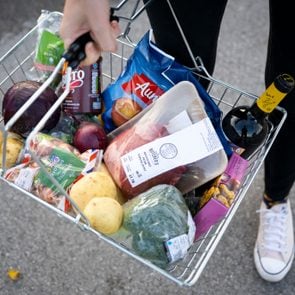These 5 States Are Slashing Grocery Taxes
Updated: Feb. 06, 2023

Grocery shopping has gotten more expensive, but these states are looking to make it more affordable
According to Consumer Price Data gathered in December 2022, the food-at-home price index jumped 11.8% over the course of 2022. Certain items, like cereals and baked goods, rose a whopping 16.1%, while others, like meat, poultry, fish and eggs, went up 7.7%. Dairy products came in at a steep 15.3%. But no matter which groceries you’re stocking up on, the fact remains: They’re getting more expensive.
In light of this stark economic reality, many consumers are hoping for relief in the form of reductions in grocery tax, a type of sales tax levied explicitly on groceries. Indeed, if you live in one of the U.S. states that still implement grocery tax, you know those taxes can add substantial charges to your grocery bills. Fortunately, five states have recently lowered their grocery tax rates, and four others offer grocery credits. Read on to learn how you might be affected and how it can help save money on groceries.
Get Reader’s Digest’s Read Up newsletter for money-saving tips, cleaning, travel, tech and fun facts all week long.
What is a grocery tax, and which states have it?
Forty-five U.S. states impose a sales tax of some sort. Of those 45, 13 have a grocery tax: Alabama, Arkansas, Hawaii, Idaho, Illinois, Kansas, Mississippi, Missouri, Oklahoma, South Dakota, Tennessee, Utah and Virginia. Grocery taxes in those states range from 4% to 7% (as of April 2022), and of those 13 states, six tax groceries at a lower rate than typical sales tax: Arkansas, Illinois, Missouri, Tennessee, Utah and Virginia.
Which states are cutting their grocery tax?
Due to inflation concerns, five states passed laws in 2023 to lower their grocery tax rates.
Those states are:
- Kansas
- Idaho
- Illinois
- Tennessee
- Virginia
As of right now, it’s difficult to say if other states will follow suit, especially given the controversy surrounding the efficacy of slashing grocery taxes.
Which states offer grocery credits?

In lieu of lowering the grocery tax, some states have allotted tax credits to partially offset the cost of food for low-income families. Those states are Hawaii, Idaho, Kansas and Oklahoma. These tax credits can actually be more beneficial to low-income families than grocery tax cuts, according to Jared Walczak, vice president of the states project at the nonprofit The Tax Foundation. So, if you live in one of these states and do not yet take advantage of these tax credits, be sure to do so when filing your taxes this year. Check your eligibility at the following sites:
How helpful are grocery tax cuts, really?
First and foremost, experts agree that grocery taxes in general hurt vulnerable populations. In the words of Andy Harig, a vice president at FMI, a food industry association, in an interview with the Washington Times: “Grocery taxes are fundamentally bad public policy because they disproportionately impact lower-income families.” This is because lower-income families spend a larger percentage of their income on groceries, compared with middle- or high-income families. Indeed, the Center on Budget and Policy Priorities states that the lowest-income fifth of families spend almost double the share of their annual income on food as the highest-income fifth (10.3% versus 5.7%). These low-income households are also disproportionately comprised of people of color, given current and historic systemic racism.
So, it makes sense that policymakers might try to help lower-income families save money by cutting grocery taxes. However, according to CNBC and the Tax Foundation, grocery tax cuts may not help lower-income families as much as they aim to. This is because many low-income families rely on benefits like the Supplemental Nutrition Assistance Program (SNAP), reducing their taxable consumption of food, and thus their savings on sales tax exemptions.
What is the recommended policy move here for states? According to Walczak, extend sales tax bases to include grocery tax and consumer services, which are more frequently used by high-income families. If you live in one of the 45 U.S. states that impose sales tax, this is something valuable to keep in mind when you fill out your ballot in November or contact your local representatives.
Sources:
- U.S. Bureau of Labor Statistics: “Consumer Price Index Summary”
- Food and Agriculture Organization of the United Nations: “FAO Food Price Index”
- Washington Times: “States cut grocery taxes to relieve rampant food inflation”
- CNBC: “As food prices soar, some states consider cutting taxes on groceries. But that may not be the best approach, research finds”
- Center on Budget and Policy Priorities: “States That Still Impose Sales Taxes on Groceries Should Consider Reducing or Eliminating Them”
- Institute on Taxation and Economic Policy: “Who Pays? A Distributional Analysis of the Tax Systems in All 50 States”
- U.S. Department of Agriculture: “Supplemental Nutrition Assistance Program (SNAP)”




















